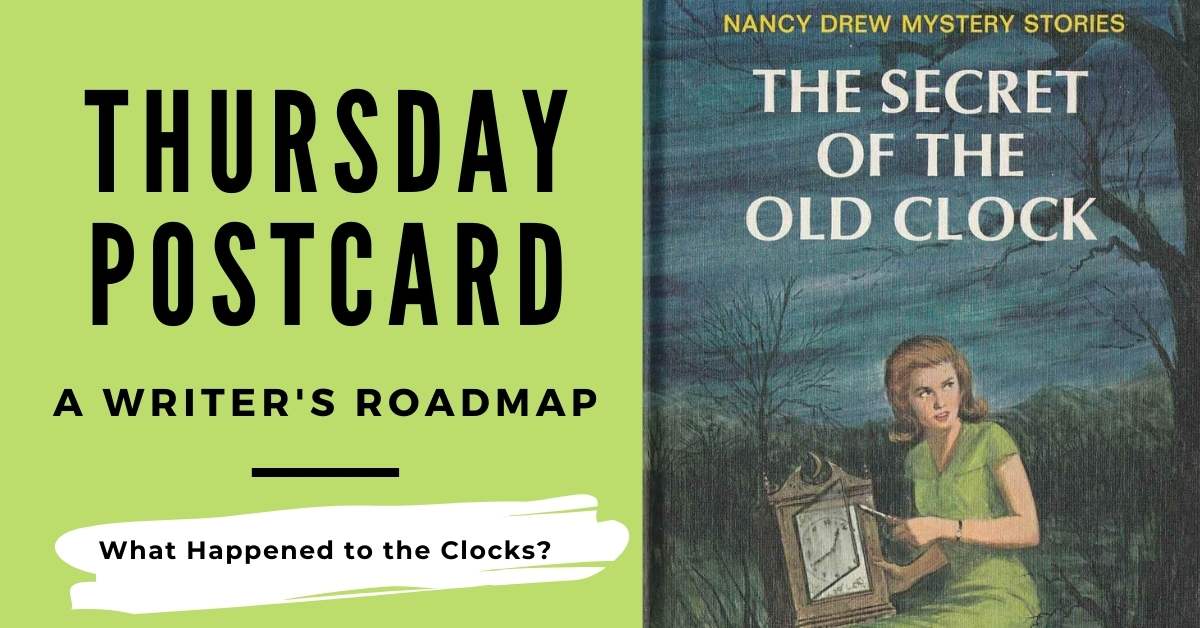Thursday Postcard
In the days of yore, when my parents told me what I’d do and when I’d do it, the changing of the clocks didn’t faze me too much. I didn’t ponder it.
Now I ponder the hell out of the clock change. Especially on the first week. Especially on the Monday.
This week’s Monday, for example, I did everything a Monday usually contains, except an hour earlier, with a snarl.
AND with a question in my mind about the clocks:
WHY?
Especially on a Monday? Mondays are a little tricky to begin with, for those who work M-F. More heart attacks, more existential angst, more accidents…according to our local news station, Monday backlash is building!
This question of the clocks is too massive to investigate here, in a newsletter for writers. Let’s turn instead to this week’s epiphany, which is: Changing the clocks twice a year doesn’t work for many people because it makes life unnecessarily complicated.
The Benefits of Focusing on Simplicity in Your Writing Life
My office whiteboard used to be complex. It had four sections: editing projects, writing projects, teaching projects, and “running the business” projects.
Some of those sections had up to 20 projects either in progress or planned for the future. Each project had multiple associated tasks.
I finally realized that wasn’t helping me. For one thing, I spent too much time each day assessing which project to work on. Time that could have been productive was being used to make a decision, and this was happening EVERY DAY.
Eliminating Complexity Helps You Make Progress With Writing
The process of writing a book is complex enough. So is running a business. This makes sense, since we’re human.
Isn’t human life by nature complex?
We breathe, eat, walk around, think, feel, and so on. Those are complex activities, if you break them down. Along with that, we live in systems and societies, our choices impacted by organizations we don’t even know exist.
But if you zoom out, NO, life isn’t that complex. We’re born, we live, we die. If we’re lucky, we might have 80 years on Earth. Not to be morbid, but we really have no idea when we’re going to die.
Complexity can make things (systems, processes, engines, lives) more likely to break down, and harder to fix when they do break down.
Doesn’t it make sense to keep things as simple as we can?
To quote John “Hannibal” Smith from TV’s The A-Team:

“There are two ways we can do this: the easy way, and the hard way.”
The easy way is to eliminate complexity everywhere possible.
It comes down to Clarity, Focus, and Action.
The Keywords are: Clarity, Focus…Action!
The day of my whiteboard epiphany, I erased every project that wasn’t either:
1) happening now or
2) going to be a big factor in my future growth or comfort.
The “writing projects” area, which used to contain idk, about 17 items, went down to one word: “NOVEL.”
The “running the business” projects area, which used to contain all kinds of things, now has one thing at a time. Currently, the word is “TAXES.” (They’re due later in Canada for sole proprietors–I have until June 15!)
In the “teaching projects” area, I crossed off “Marketing Course” on Tuesday–the day I finished it. In its place I wrote the next project, “BPF Rollout.”
The “editing projects” area is a bit more complex–I have four manuscripts in various stages. That system works for me so I left it alone.
What’s on Your Whiteboard?
(Or your metaphorical whiteboard, if you don’t have an actual one.)
Is your list of projects too complex? Or is it just right?
Let me know–I love your emails!
Cheers,
Pat

